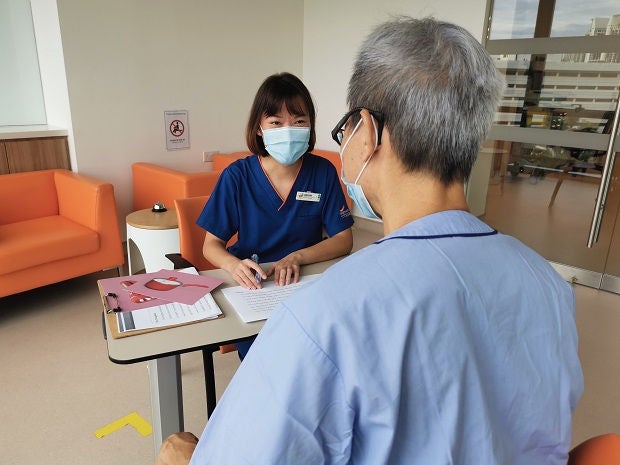
Patients with aphasia may have difficulties with communication, and this may affect their relationships, quality of life, and socioemotional well-being.
Globally, it is estimated that one-third of stroke survivors experience aphasia. At Outram Community Hospital (OCH), under SingHealth Community Hospitals, about 30 per cent of stroke patients suffer from this condition, said Ms Jamie Yin, Senior Speech Therapist, OCH.
Understanding aphasia
When a patient has a stroke, the blockage or rupture of blood vessels in the brain may sometimes result in brain cell death or damage in areas that control language — typically the left side of the brain.
Aphasia may also be caused by head injury and trauma, and brain tumours.
There are two main types of aphasia. People with receptive aphasia have problems understanding what others say, while those with expressive aphasia have difficulty expressing their needs and thoughts. Aphasia can also cause difficulties in reading, writing, and comprehending numbers.
A common misconception is that patients with aphasia have lower intelligence quotient (IQ), but that is far from the truth. “Aphasia affects a person’s communication abilities but not their intelligence per se,” Ms Yin said.
Road to recovery
Aphasia can differ in severity, depending on the extent and area of damage to the language areas of the brain. In some cases, patients with mild aphasia may be able to recover spontaneously. However, it is recommended that patients be assessed by a Speech Therapist so that the aphasia, even in its mildest forms, can be monitored and treated, if required.
Speech therapy is the recommended treatment for patients with aphasia to relearn language and communication skills, since both surgery and medication do not alleviate this condition. Speech Therapists typically evaluate the type and severity of the aphasia, before setting therapy goals with the patients and their family.
“Recovery depends on factors such as age, extent of the stroke, other medical conditions, how early speech therapy was introduced, as well as the intensity of the therapy. People with aphasia may experience greater recovery if therapy is started early and provided more intensively at the start of treatment,” said Ms Yin.
Communication tips
Aphasia may affect a patient’s social and emotional well-being. Here are some tips from Ms Yin on how to ease communication challenges and better support a family member, friend or colleague with the condition:
• Talk to them in short and clear sentences.
• Give them time to respond and do not rush them.
• If they did not understand you, repeat yourself slowly and clearly.
• Supplement the conversation with hand gestures, writing or drawing.
• Be patient and encouraging, and communicate respectfully.
• If either party faces frustration due to a communication breakdown, consider taking a break from the conversation and try again later.













 Get it on Google Play
Get it on Google Play